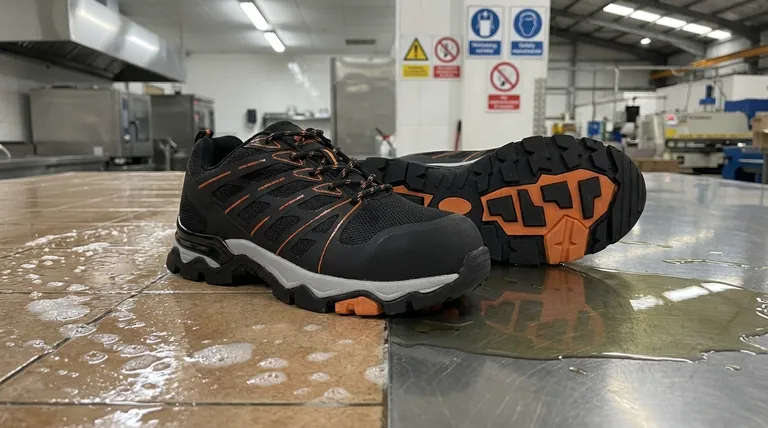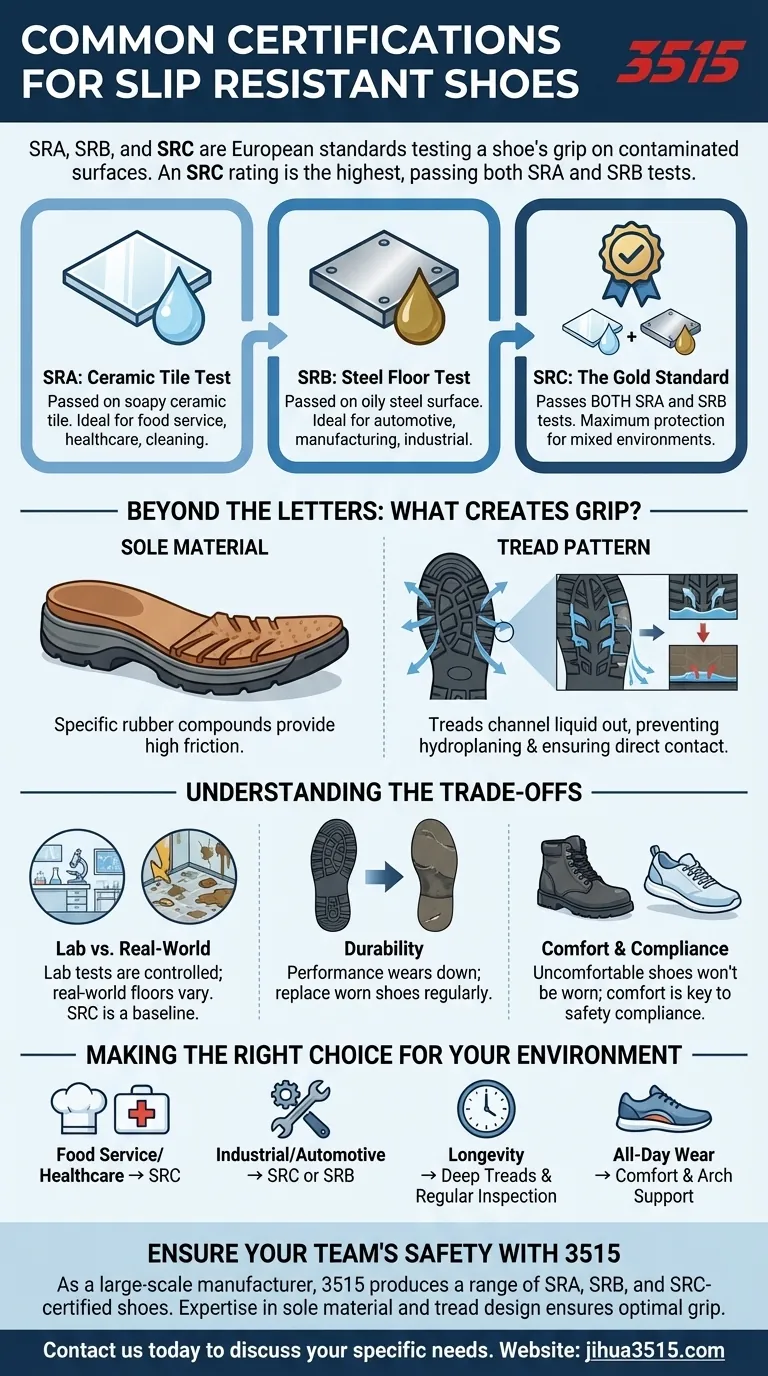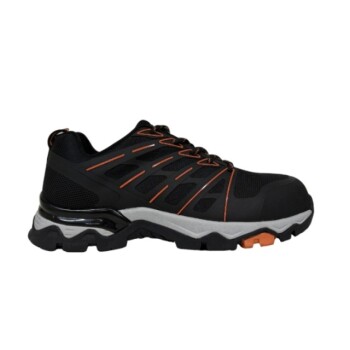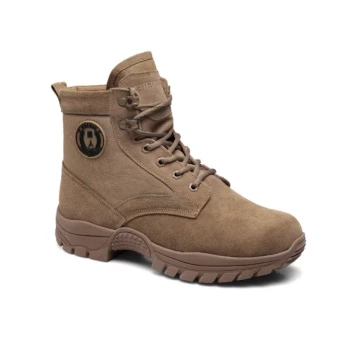The most common certifications for slip-resistant shoes are SRA, SRB, and SRC. These European standards test a shoe's grip on specific contaminated surfaces. An SRA rating means the shoe passed on a soapy ceramic tile, SRB means it passed on an oily steel surface, and an SRC rating signifies that the shoe has successfully passed both tests.
While an SRC certification is the highest technical standard, true workplace safety comes from matching the shoe's sole design—its material and tread pattern—to the specific slip hazards you face every day.

How Slip Resistance is Measured: The "SR" Ratings
To standardize safety, regulatory bodies created specific, repeatable tests. A shoe either passes or fails these tests, resulting in a clear certification that helps you understand its capabilities.
SRA: The Ceramic Tile Test
An SRA rating is granted when a shoe passes a slip-resistance test on a ceramic tile surface wetted with a sodium lauryl sulphate solution, which is essentially soapy water.
This test simulates conditions commonly found in environments like hospital hallways, commercial kitchens, and food processing plants where water and cleaning agents are a constant presence.
SRB: The Steel Floor Test
An SRB rating is achieved when a shoe proves its grip on a smooth steel floor coated with glycerol. Glycerol is used to simulate oil, grease, and other industrial lubricants.
This test is highly relevant for workers in automotive garages, manufacturing facilities, and industrial settings where contact with oils and greasy substances is a daily risk.
SRC: The Gold Standard
A shoe does not undergo a separate "SRC test." Instead, the SRC rating is the highest certification awarded to footwear that has passed both the SRA and the SRB tests.
Choosing an SRC-rated shoe provides the most comprehensive protection, ensuring it has been proven effective against both water-based and oil-based slip hazards.
Beyond the Letters: What Truly Creates Grip?
The certification tells you that a shoe performs, but understanding the design tells you why. The effectiveness of any slip-resistant shoe comes down to the physics of its sole.
The Role of Sole Material
Most slip-resistant soles are made from specific rubber compounds. Rubber is used because it has a naturally high coefficient of friction, meaning it resists sliding when pressed against another surface.
The Importance of Tread Pattern
The pattern of grooves, or treads, on the bottom of the shoe is the most critical design element. These grooves are engineered to channel liquid out from under the sole.
This function is similar to the tires on your car, which use treads to push water away to maintain contact with the road. Deep, multi-directional grooves provide the best grip by allowing fluids to escape in any direction.
How Treads Prevent Hydroplaning
When you step on a wet or oily spot, a thin film of liquid can get trapped between your shoe and the floor, causing you to "hydroplane."
The channels in the sole provide an escape route for this liquid, allowing the rubber to make direct, solid contact with the floor surface. This direct contact is what creates the friction needed to prevent a fall.
Understanding the Trade-offs
A certification is a crucial starting point, but it's not a complete guarantee of safety in every situation. You must consider the context of your work environment.
Certification vs. Real-World Conditions
Laboratory tests are perfectly controlled. Real-world floors, however, can be contaminated with a mix of substances like dust, flour, or different chemical fluids not used in testing. An SRC rating is an excellent baseline, but it can't account for every possible variable.
Durability and Wear
A slip-resistance rating applies to the shoe when it is new. As you wear the shoe, the deep treads will wear down, smoothing out the sole. A worn-out sole has significantly reduced ability to channel liquids and will no longer perform at its certified level.
Comfort and Compliance
The safest shoe is one that is actually worn. If a certified shoe is heavy, stiff, or uncomfortable, workers may be tempted to wear something else, completely negating its safety benefits. Comfort is not a luxury; it is a key component of safety compliance.
Making the Right Choice for Your Environment
Use certifications to guide your decision, but make the final choice based on your specific daily hazards and needs.
- If your primary focus is food service or healthcare: Prioritize an SRC rating to handle both water-based spills (SRA) and potential greasy messes (SRB).
- If your primary focus is an industrial or automotive setting: The SRB test is most relevant, but choosing an SRC-certified shoe offers the most complete protection.
- If your primary focus is longevity: Look for shoes with visibly deep and durable tread patterns and plan to inspect them regularly for wear.
- If your primary focus is all-day wear: Ensure the certified shoe also provides the necessary arch support and comfort, because an unworn safety shoe offers zero protection.
Ultimately, the best slip-resistant shoe is a certified one that is properly matched to your environment and comfortable enough to wear consistently.
Summary Table:
| Certification | Test Surface & Contaminant | Ideal For |
|---|---|---|
| SRA | Ceramic tile with soapy water | Food service, healthcare, cleaning |
| SRB | Steel floor with glycerol (oil/grease) | Automotive, manufacturing, industrial |
| SRC | Passes both SRA and SRB tests | Maximum protection for mixed environments |
Ensure your team's safety with certified, high-performance footwear from 3515. As a large-scale manufacturer, we produce a comprehensive range of SRA, SRB, and SRC-certified shoes and boots for distributors, brand owners, and bulk clients. Our expertise in sole material and tread design ensures optimal grip and durability for any workplace. Contact us today to discuss your specific needs and receive a customized solution.
Visual Guide

Related Products
- Premium KPU Injection Athletic Style Safety Shoes
- Wholesale Anti-Smash & Puncture-Proof Safety Shoes Custom Manufacturing for Brands
- Premium High-Cut Waterproof Safety Boots Manufacturing & Wholesale Solutions
- Premium Wholesale Waterproof Safety Boots High Performance Protection for Industrial Markets
- Heavy-Duty Waterproof Nubuck Safety Boots Safety Shoes for Bulk Supply
People Also Ask
- What protective functions do safety shoes provide in construction safety? Maximize Site Safety and Reduce Downtime
- How does the structural design of industrial-grade safety shoes provide protection? Engineering Foot Health at Work
- What are the requirements for a protective toe cap? Meet ASTM F2413 Standards for Maximum Safety
- Why are safety shoes mandatory for historical stone cleaning? Essential Gear for Restoration Projects
- What is the purpose of steel-toe moc toe boots? Achieve All-Day Safety and Comfort



















